The market of IT start-ups in retail: the expectations of investors and large customers on the example of FRIA and X5 Retail Group
Another week - until March 6 - IT startups can apply for the 12th Accelerator and get a pre-seed investment. Retail is one of the industry tracks of the 12th set, in February we held an event with the participation of partner X5 Retail Group, where company representatives told which startups they are interested in and how they are ready to work with them.
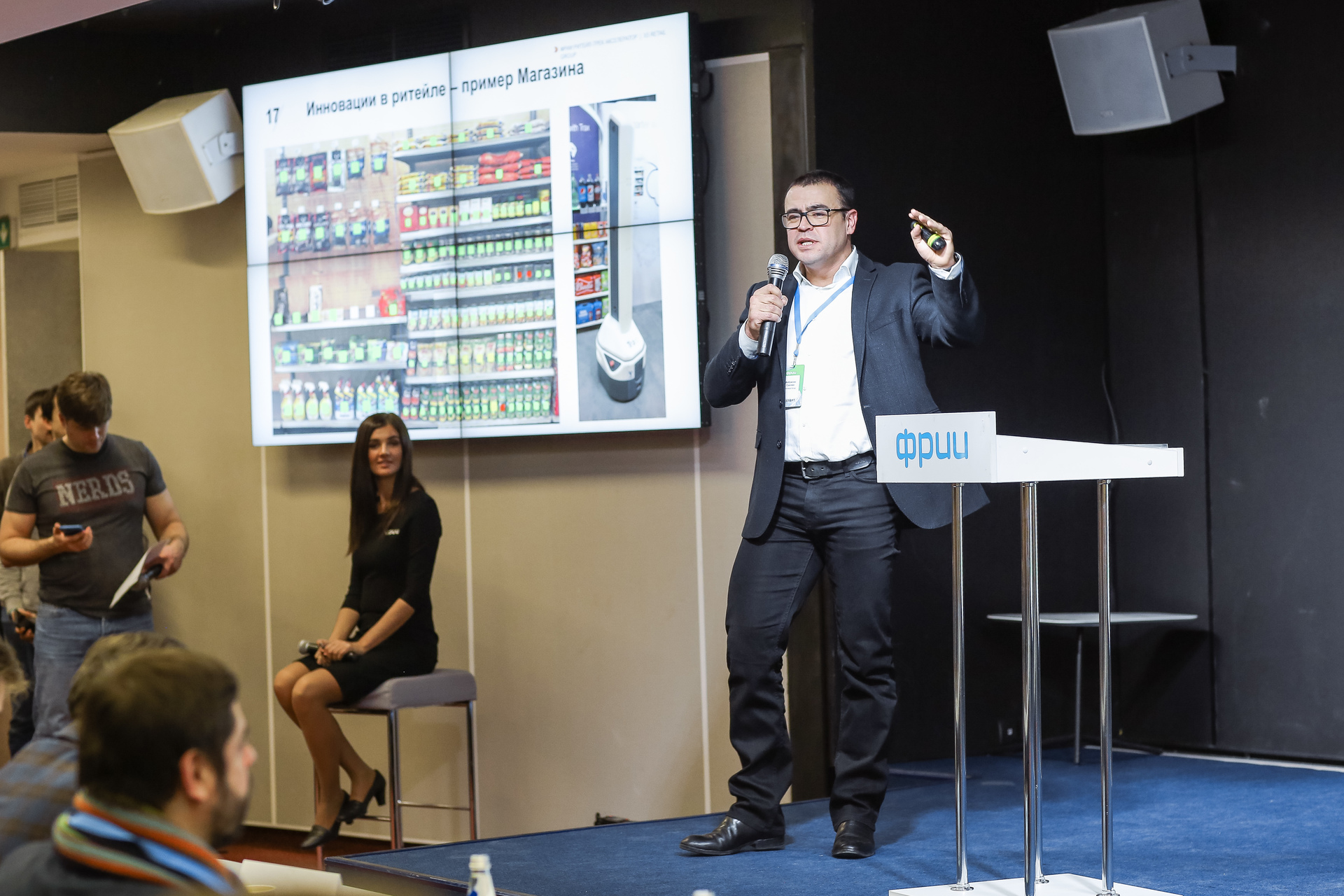
According to the results of the event, we publish material on promising areas for investment in retail startups according to FRIA, the volume of venture capital investments in this area, as well as how startups are interested in X5 Retail Group, and how the company is ready to work with them.
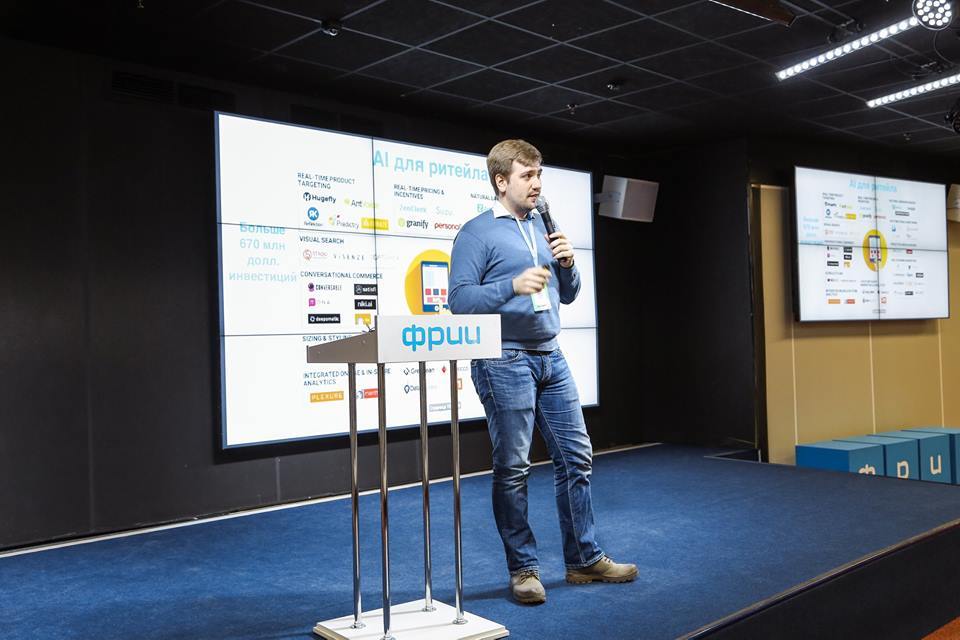
')
In FRII I am responsible for investments in IT companies in the areas of retail, education and the Internet of things at the seed (up to 25 million rubles) and round A (up to 324 million rubles) stages, which showed good growth following the Accelerator, and the solution has competitive advantages (technological or organizational, for example, at the expense of accumulated data). It is also desirable that the solution has international potential, and it has synergy with the current IIDF portfolio.
In 2015, the global turnover of the retail industry was $ 22.6 trillion, while the investments of large companies from traditional retail in IT start-up solutions for many years remained low. Now the situation is changing - major players in the retail market are turning their attention to startups in the retail-tech sector.
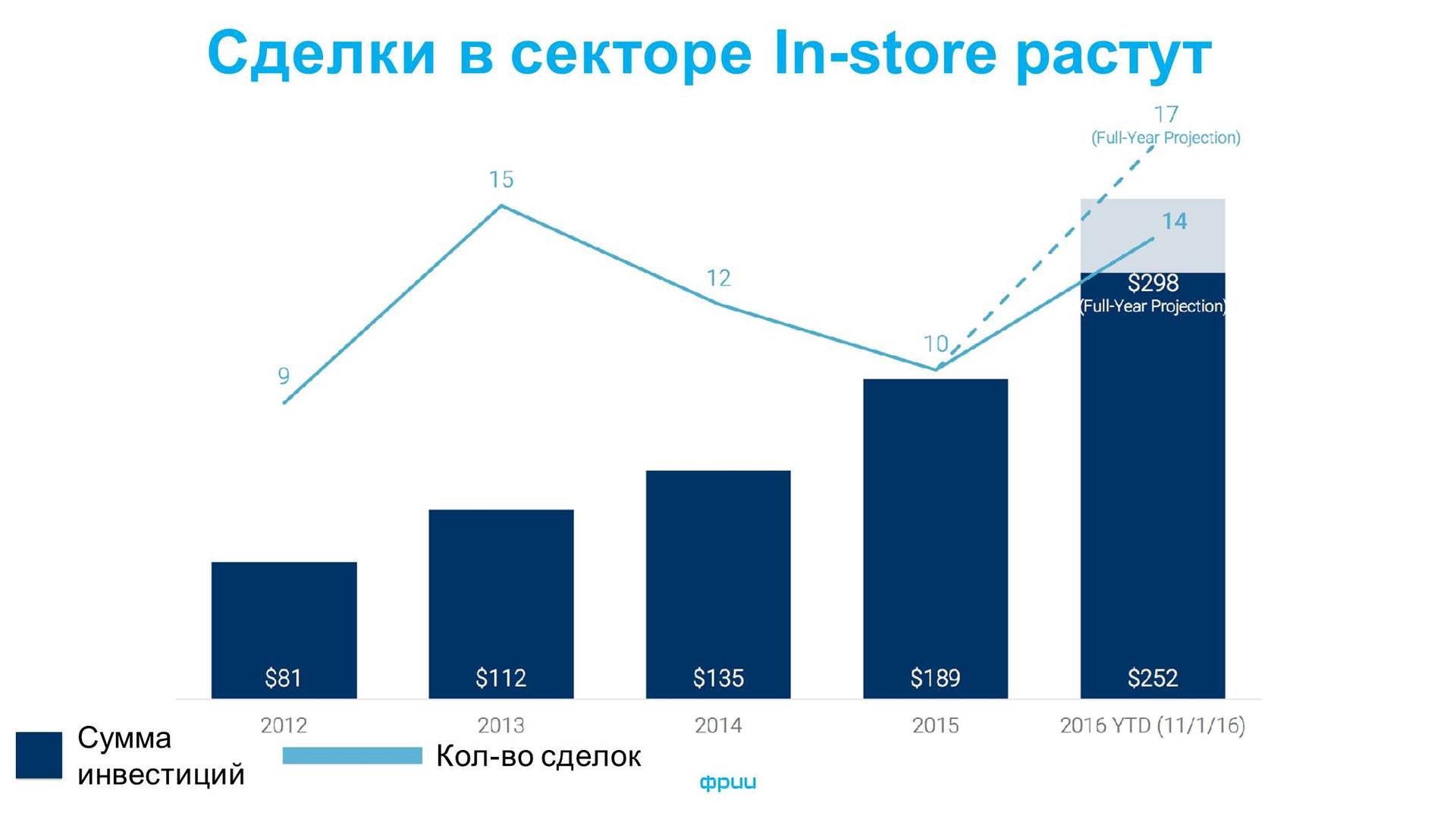
On the chart - investments in the in-store sector from venture investors in the early stages
According to CB Insights, the global market for technology investments in offline retail is growing. In 2016, investments in the in-store sector as a whole exceeded the forecasted maximum and amounted to more than $ 800 million. In the past two years alone, global investments in retail-tech startups have amounted to over $ 2.3 billion (according to Tracxn).
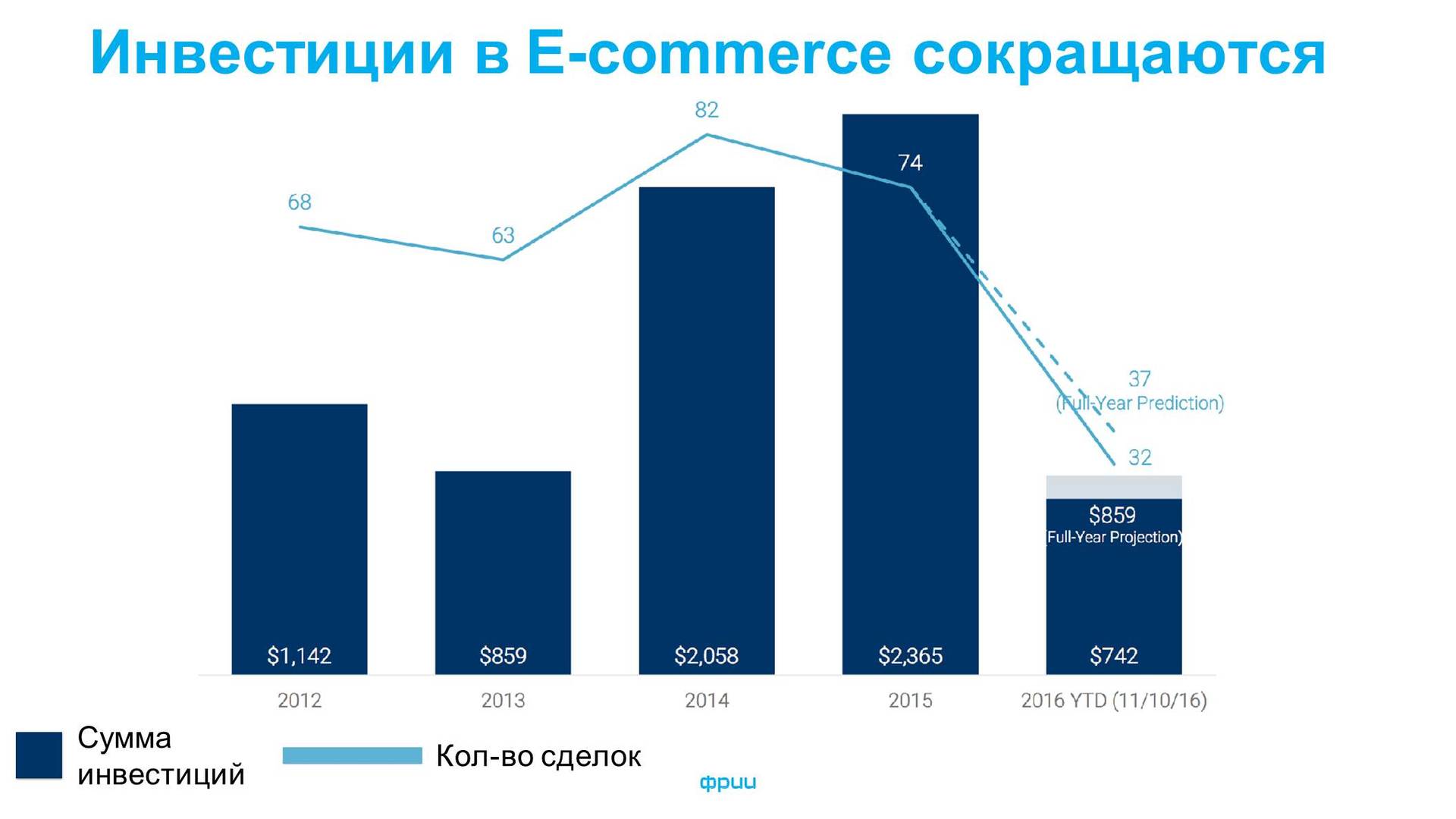
Investments in e-commerce from early-stage venture investors
Investments in e-commerce are declining, investors have “cooled down” to this area - this is explained by the fact that the sphere is already quite saturated. So big players have appeared on the market that bringing a new e-commerce startup to the market is now fraught with too large capital expenditures, so venture investors are wary of new startups in e-commerce.
At the same time, the number and technological diversity of new start-up projects is growing, the solutions of which may be applicable in retail. Map of IT startups in retail by category:
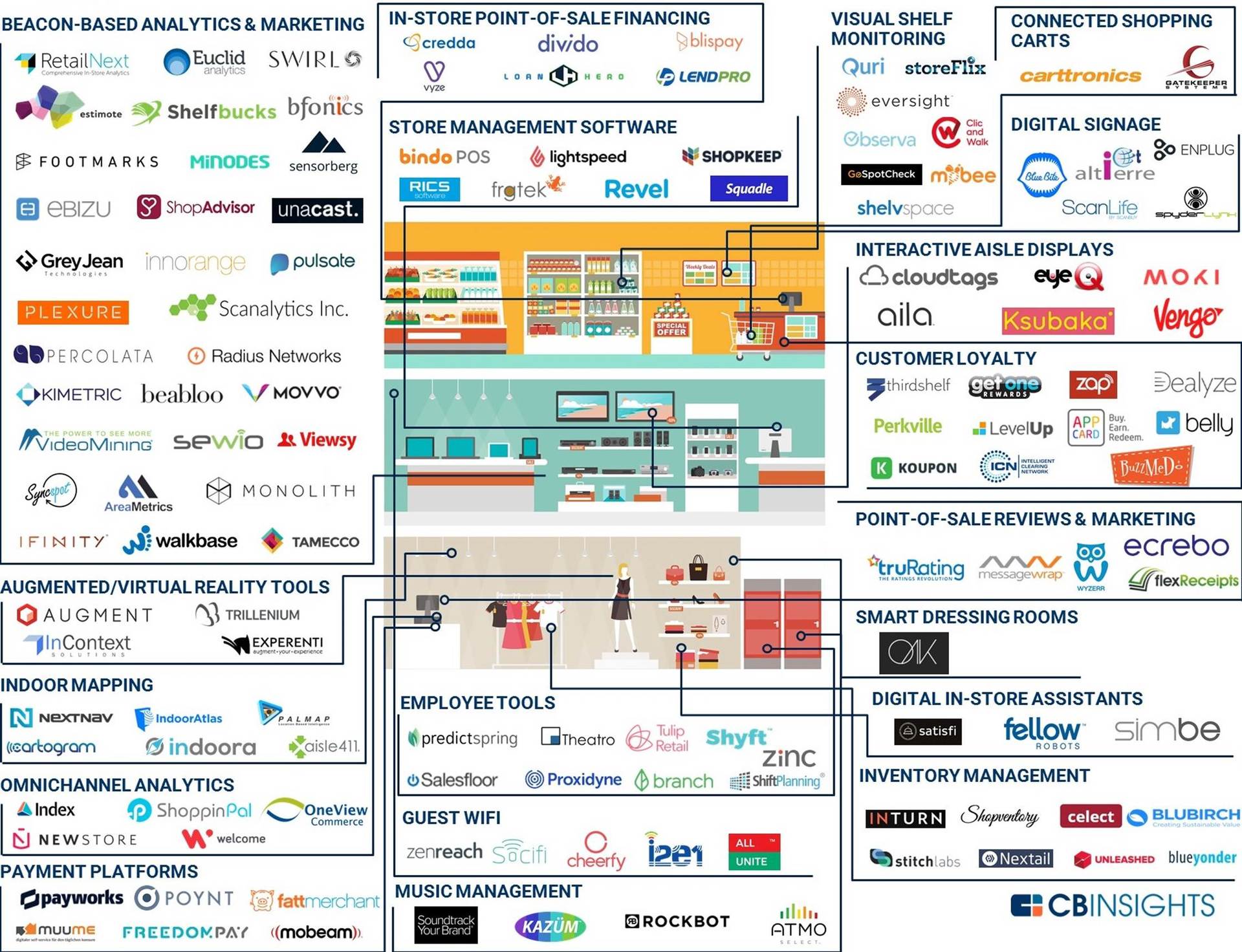
The most interesting segment for investment here is services that help optimize work in the store, there are quite a lot of them in the world.
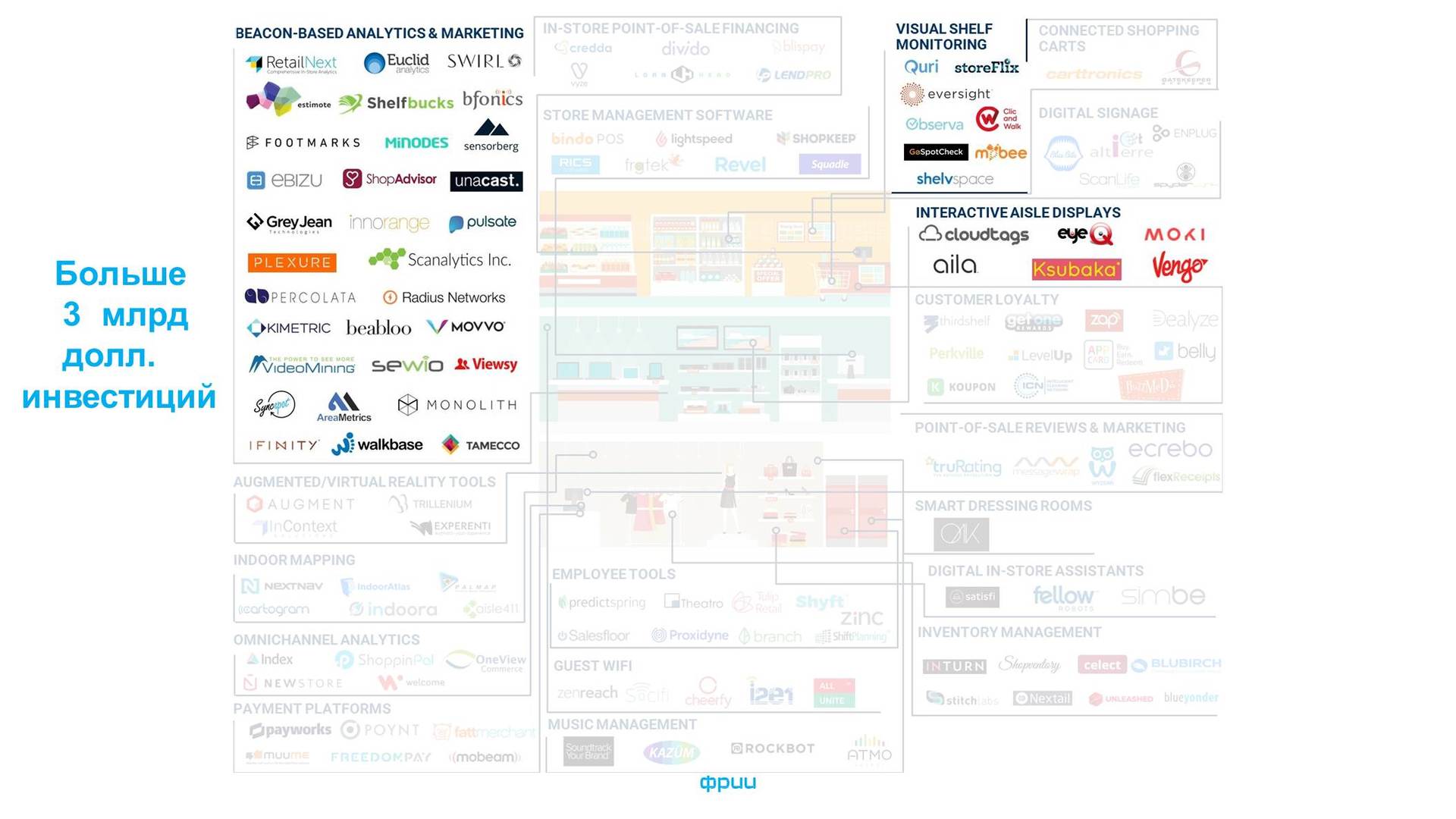
Over the past few years, more than $ 3 billion has been invested in the areas highlighted on the map above. Some services help to track user behavior, show unwanted actions, such as theft. Another part - services that help with the arrangement of goods on the shelves, with merchandising: analyze the behavior of users, as with the greatest benefit for a retail outlet to arrange the goods correctly. And the third part is services that help to communicate with users: display advertising and advertising, which adapts to the behavior of users.
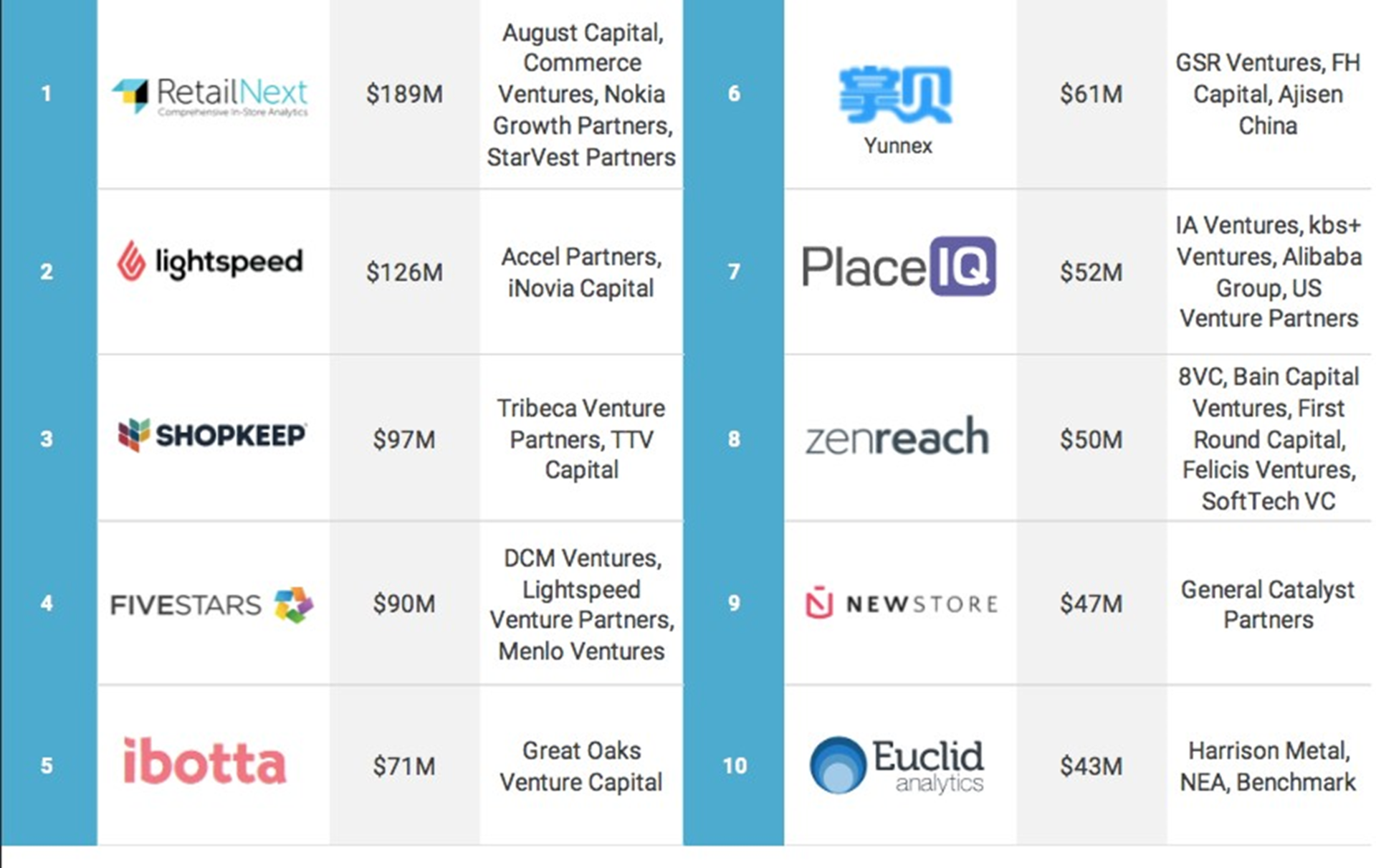
Most investments were made in the following areas:
- “smart” cash registers and services integrated with POS terminals - Lightspeed, Yunnex, Shopkeep, Fivestars;
- services that help to track online goods in the store and receive information about what the visitor bought - Retail Next, PlaceIQ;
- analytics services that link the user's online purchases with offline and user behavior in the store - Zenreach, NewStore, Fivestars;

The next stage in the development of intellectual services is not only to collect and analyze information, but also to make a predictive analysis based on it: what range will be interesting to the user in the near future, how to optimize the display of goods to increase sales in the coming month, and so on. More than 670 million investments have been invested in startups of the Artificial Intelligence segment for retail over the past few years.
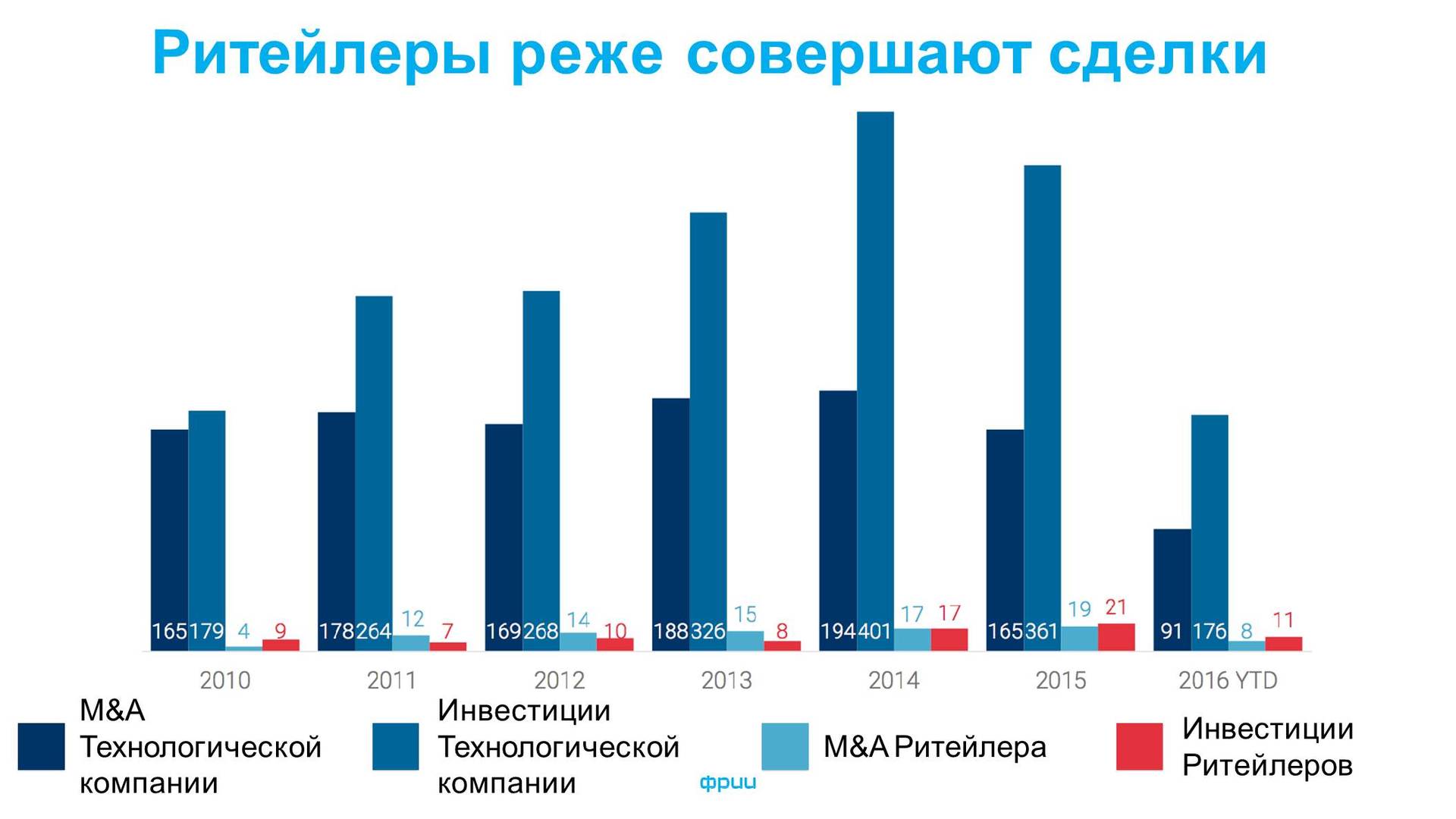
Most of the investment in retail-tech is done by technology companies, not by traditional retailers. In the future, a retail company can rather be viewed not as investors or buyers of IT start-ups, but as clients to whom these start-ups primarily sell their solutions. Technological giants like Google and Amazon are more likely to invest in successful companies in this field.
Retailers need a product rather than process optimization. Retailers primarily buy ready-made solutions to build them into their product line. According to CB Insights, in 36% of cases, companies in retail are considering the purchase of IT solutions by a startup in order to actually outsource their development department.

The Russian market is not very developed yet - about 4-6 transactions per year take place in retail. But in general, even the Russian market is enough for retail companies and IT start-ups in this area to actively develop. Trade accounted for 11% of its contribution to the country's GDP in 2015, there are hundreds of thousands of small, medium and large companies in the country, with which startups can help streamline operations.
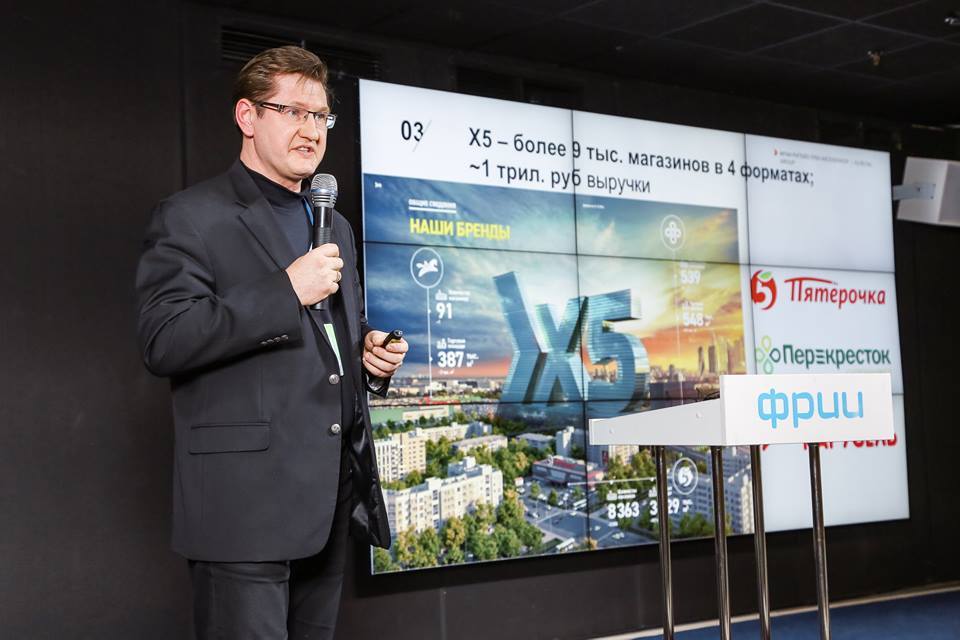
X5 Retail Group today is more than 9,000 stores in four formats (Pyaterochka, Perekrestok, Karusel, and convenience stores with various brands), about 1 trillion rubles in annual turnover.
X5 Retail Group is the FRIA partner in the industry track of the 12th Accelerator. Let's designate startups in which areas companies are interested in.

X5 Retail Group sees opportunities for innovation in five business areas. Startup solutions can be applied in the following areas.
1. Business processes in which companies may be interested in cooperation with startups are, for example, robotization in logistics and inside a store.
2. Services and service - in the store and inside the supply chain.
3. Business models that can change the face of retail - such as Google Express and UBER. When someone enters between the retailer and the buyer and changes the business model, the retailer remains on the sidelines, large retailers would not like it.
4. Technology - underlie all these areas.
If you look at the retailer's business from the inside - start-up technologies can be implemented at one of the stages of the value chain in retail.
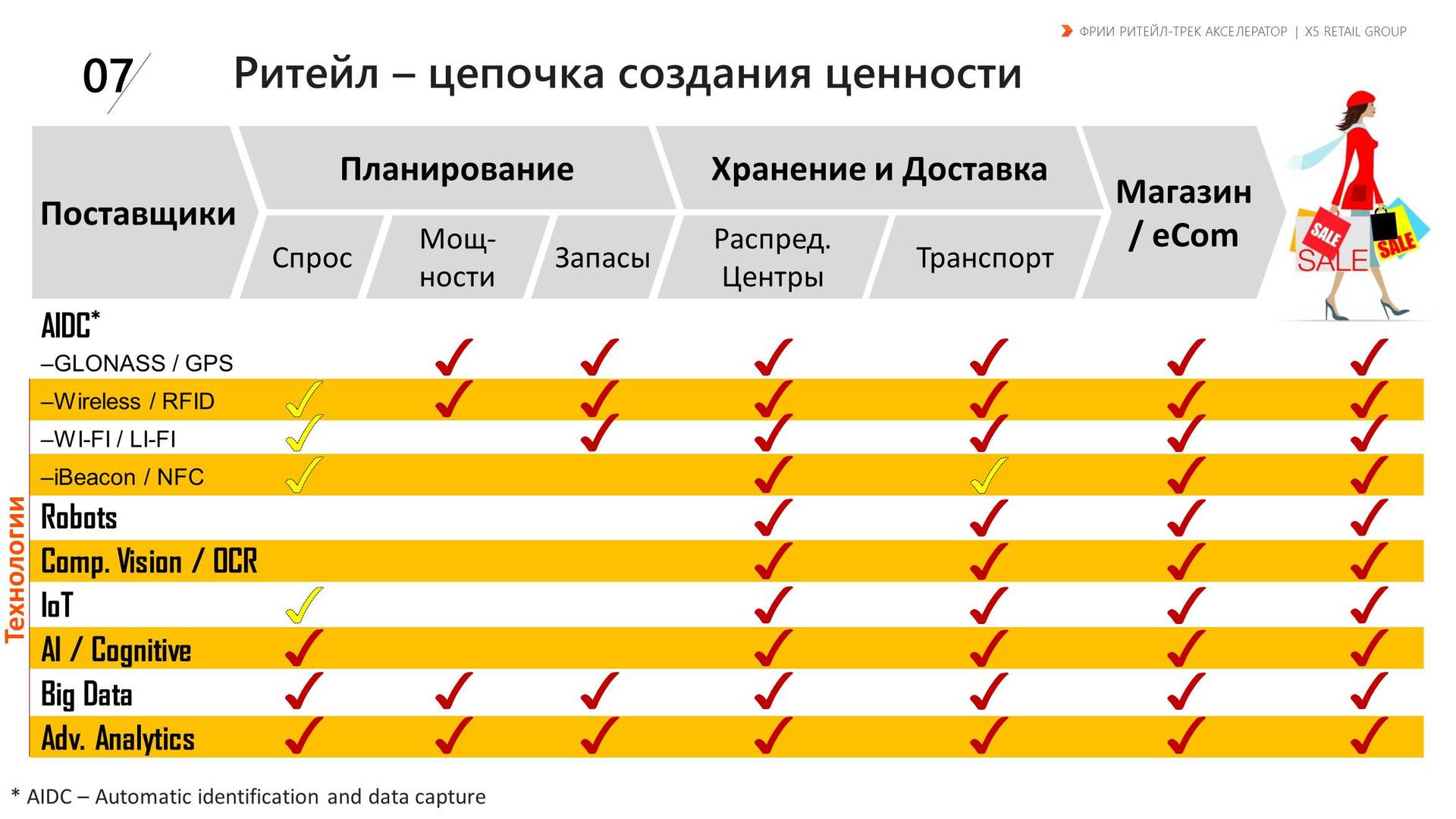
1. Suppliers - from the farm to the shelf and the buyer. In the West, everything goes to the fact that the retailer wants to know where, when and in what conditions a particular product is produced.
2. Planning - demand (predict how much, where and what we sell), capacities (stores, logistics), stocks.
3. Storage and delivery - distribution centers and transportation.
4. Shops / online stores, buyer - Big Data and predictive analytics. Not only understand the methodologies and technologies of collecting analytics, but also get useful data for the retailer.
Technologies that can be used at these stages of the supply chain are shown in the diagram above.
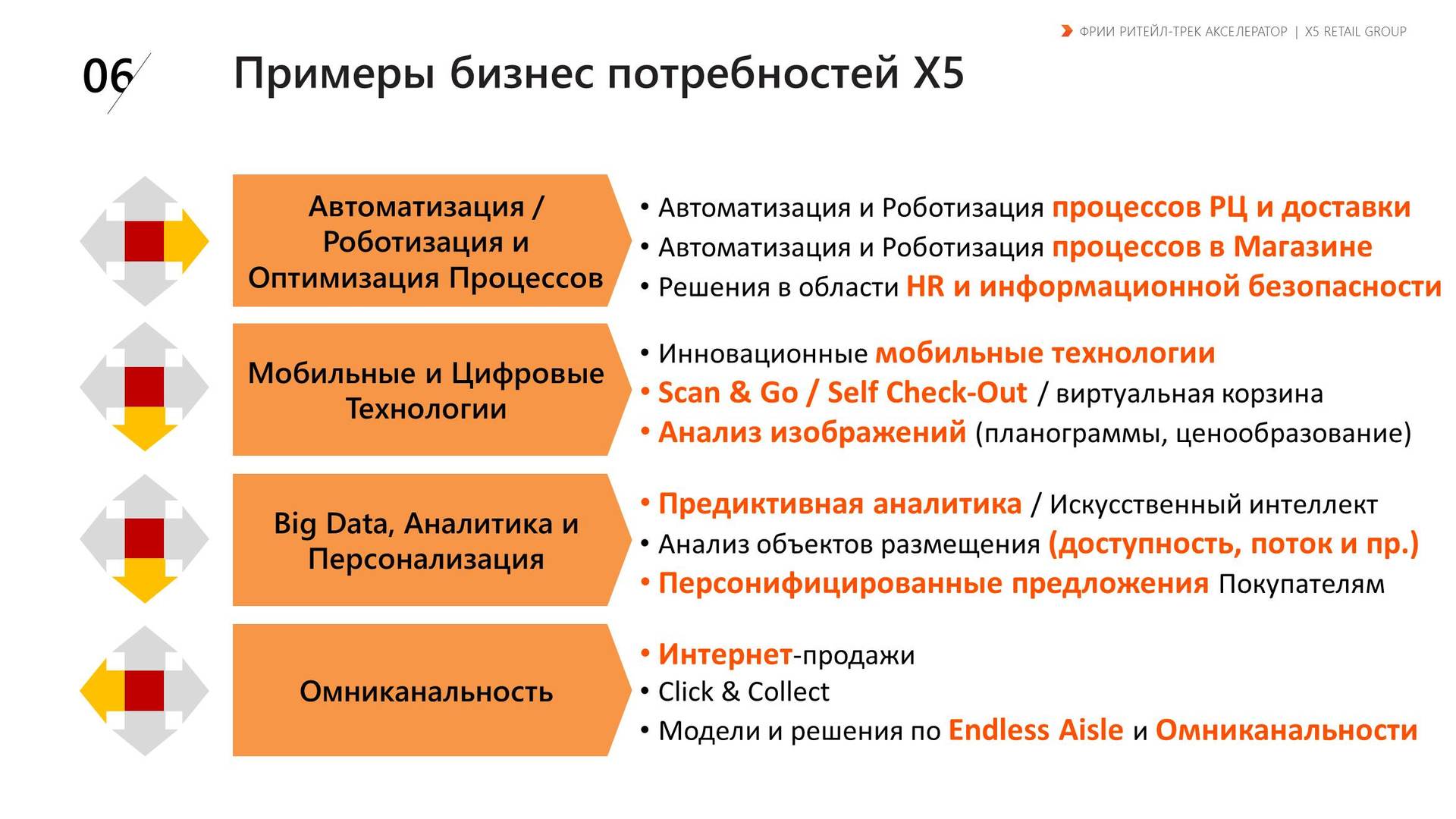
1. Automation, robotization, process optimization - inside distribution centers, delivery and inside stores. So far, a huge number of processes of the retailer are tied to people and cost a lot. The shops in the West are already starting to replace the robots, we will soon come to this. The company also hires and trains more than 50,000 people a year, which is why HR solutions are very interesting, which optimize or automate the process of hiring, understanding the skills, capabilities and competencies of candidates.
Example: in 2012, Amazon acquired Kiva Systems. Today, Amazon no longer needs wide passageways, as robots carry goods. 50-70% of the time in a typical distribution center is spent by people searching for goods, Amazon, due to the robotization of this process, reduced the cost of labor in the RC by 30-40%, and each order can be fulfilled 6 times faster.
2. Mobile and digital technologies . In the world, check-out technologies are already working, when people come to the store and scan the QR code using a mobile phone - they buy goods, bypassing the cash register. Image recognition technology allows you to determine the occupancy of the shelves. The store, through cameras, recognizes the shopping cart and goods on the shelves, sees where the customer takes the products from and what products, knows the price of the products.
3. Big Data, analytics and personalization . Interesting are any solutions that will help not only collect data on the entire supply chain, but also analyze and optimize processes from the “bed” to the customers.
4. Omnichanality . Everything related to online sales. Retailers want to understand what the customer wants when, whether they are ready to pay, and to correlate the actions of customers offline with actions online.
X5 Retail Group is ready to share with the start-ups knowledge of the industry, assess the applicability of start-up ideas, help companies grow, determine the market demand for the product and pilot solutions that are interesting for X5 Retail Group. Conditions for success - a business case with numbers to increase sales and reduce costs X5 Retail Group.
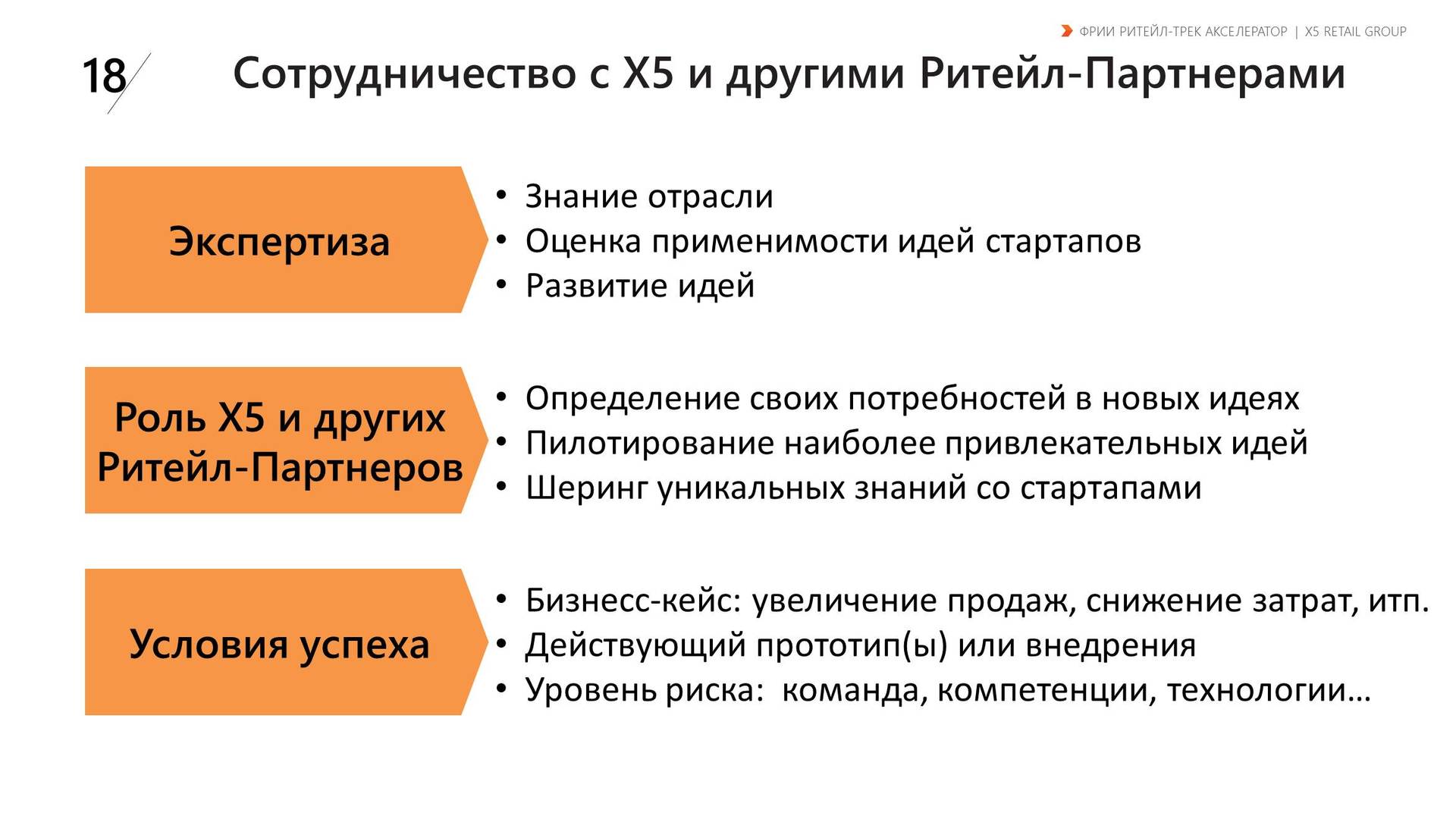
The goal of a startup with a major partner is to go to the pilot, get feedback from the partner, make the partner get the value, and prove it in numbers.
X5 Retail Group are interested in products or services that:
- help make traditional purchases faster and more comfortable,
- personalize the customer service process and collect data on the consumer basket,
- optimize the logistics and / or operation of the trading floor,
- increase conversion through a combination of online and offline sales channels.
- allow you to buy goods yourself using a mobile phone (self-checkout) and not stand in a queue,
- intellectual loyalty programs, possible due to the analysis of previously made purchases based on big data technology and machine learning.
You can hear more about the work of FRIA and Accelerator, see the pitches of retail startups from the market and, most importantly, listen to representatives of X5 Retail Group and other retail companies on the video:
FRIA Accelerator is a three-month program of accelerated development of start-ups in the areas of IT, Internet and mobile, which IIDF launches to help companies build a scalable business and grow faster to the next rounds of investments. For three months, the founders, with the help of a pool of experts, confirm the value proposition, check the viability of the business model, put sales on stream and break through the growth ceiling.
Accelerator's industry track is a chance for a startup to meet representatives of large strategic companies and speed up the launch of a joint pilot. Experts look at the final list of companies that have passed the selection, and choose which of them want to chat. Representatives of the company also meet with some founders of startups personally for mutual interest and potential pilots. IT start-ups from the retail sector, who will be selected for the 12th Accelerator, will have the opportunity to test business hypotheses on the X5 Retail Group consumer base with impersonal information on more than 3 billion purchases.
You can submit an application to the 12th Accelerator before March 6, 23:59 Moscow time. To do this, you need to fill out a questionnaire, go through an online consultation with the Preaccelerator expert and take part in the selection.

According to the results of the event, we publish material on promising areas for investment in retail startups according to FRIA, the volume of venture capital investments in this area, as well as how startups are interested in X5 Retail Group, and how the company is ready to work with them.
Nikita Yuriev, investment manager of the IIDF, on the development of the retail industry in the world and venture investments in IT startups

')
In FRII I am responsible for investments in IT companies in the areas of retail, education and the Internet of things at the seed (up to 25 million rubles) and round A (up to 324 million rubles) stages, which showed good growth following the Accelerator, and the solution has competitive advantages (technological or organizational, for example, at the expense of accumulated data). It is also desirable that the solution has international potential, and it has synergy with the current IIDF portfolio.
In 2015, the global turnover of the retail industry was $ 22.6 trillion, while the investments of large companies from traditional retail in IT start-up solutions for many years remained low. Now the situation is changing - major players in the retail market are turning their attention to startups in the retail-tech sector.

On the chart - investments in the in-store sector from venture investors in the early stages
According to CB Insights, the global market for technology investments in offline retail is growing. In 2016, investments in the in-store sector as a whole exceeded the forecasted maximum and amounted to more than $ 800 million. In the past two years alone, global investments in retail-tech startups have amounted to over $ 2.3 billion (according to Tracxn).

Investments in e-commerce from early-stage venture investors
Investments in e-commerce are declining, investors have “cooled down” to this area - this is explained by the fact that the sphere is already quite saturated. So big players have appeared on the market that bringing a new e-commerce startup to the market is now fraught with too large capital expenditures, so venture investors are wary of new startups in e-commerce.
At the same time, the number and technological diversity of new start-up projects is growing, the solutions of which may be applicable in retail. Map of IT startups in retail by category:

The most interesting segment for investment here is services that help optimize work in the store, there are quite a lot of them in the world.

Over the past few years, more than $ 3 billion has been invested in the areas highlighted on the map above. Some services help to track user behavior, show unwanted actions, such as theft. Another part - services that help with the arrangement of goods on the shelves, with merchandising: analyze the behavior of users, as with the greatest benefit for a retail outlet to arrange the goods correctly. And the third part is services that help to communicate with users: display advertising and advertising, which adapts to the behavior of users.
The largest deals for 2016

Most investments were made in the following areas:
- “smart” cash registers and services integrated with POS terminals - Lightspeed, Yunnex, Shopkeep, Fivestars;
- services that help to track online goods in the store and receive information about what the visitor bought - Retail Next, PlaceIQ;
- analytics services that link the user's online purchases with offline and user behavior in the store - Zenreach, NewStore, Fivestars;
Where is the market going?

The next stage in the development of intellectual services is not only to collect and analyze information, but also to make a predictive analysis based on it: what range will be interesting to the user in the near future, how to optimize the display of goods to increase sales in the coming month, and so on. More than 670 million investments have been invested in startups of the Artificial Intelligence segment for retail over the past few years.
Deals and exits from IT startups in retail

Most of the investment in retail-tech is done by technology companies, not by traditional retailers. In the future, a retail company can rather be viewed not as investors or buyers of IT start-ups, but as clients to whom these start-ups primarily sell their solutions. Technological giants like Google and Amazon are more likely to invest in successful companies in this field.
Retailers need a product rather than process optimization. Retailers primarily buy ready-made solutions to build them into their product line. According to CB Insights, in 36% of cases, companies in retail are considering the purchase of IT solutions by a startup in order to actually outsource their development department.
Development of the industry in Russia

The Russian market is not very developed yet - about 4-6 transactions per year take place in retail. But in general, even the Russian market is enough for retail companies and IT start-ups in this area to actively develop. Trade accounted for 11% of its contribution to the country's GDP in 2015, there are hundreds of thousands of small, medium and large companies in the country, with which startups can help streamline operations.
Vadim Kapustin, Director of Strategic Marketing and Planning, X5 Retail Group - about technologies of interest to the company

X5 Retail Group today is more than 9,000 stores in four formats (Pyaterochka, Perekrestok, Karusel, and convenience stores with various brands), about 1 trillion rubles in annual turnover.
X5 Retail Group is the FRIA partner in the industry track of the 12th Accelerator. Let's designate startups in which areas companies are interested in.
5 types of innovations according to X5 Retail Group

X5 Retail Group sees opportunities for innovation in five business areas. Startup solutions can be applied in the following areas.
1. Business processes in which companies may be interested in cooperation with startups are, for example, robotization in logistics and inside a store.
2. Services and service - in the store and inside the supply chain.
3. Business models that can change the face of retail - such as Google Express and UBER. When someone enters between the retailer and the buyer and changes the business model, the retailer remains on the sidelines, large retailers would not like it.
4. Technology - underlie all these areas.
If you look at the retailer's business from the inside - start-up technologies can be implemented at one of the stages of the value chain in retail.

1. Suppliers - from the farm to the shelf and the buyer. In the West, everything goes to the fact that the retailer wants to know where, when and in what conditions a particular product is produced.
2. Planning - demand (predict how much, where and what we sell), capacities (stores, logistics), stocks.
3. Storage and delivery - distribution centers and transportation.
4. Shops / online stores, buyer - Big Data and predictive analytics. Not only understand the methodologies and technologies of collecting analytics, but also get useful data for the retailer.
Technologies that can be used at these stages of the supply chain are shown in the diagram above.
Business Requirements X5 Retail Group

1. Automation, robotization, process optimization - inside distribution centers, delivery and inside stores. So far, a huge number of processes of the retailer are tied to people and cost a lot. The shops in the West are already starting to replace the robots, we will soon come to this. The company also hires and trains more than 50,000 people a year, which is why HR solutions are very interesting, which optimize or automate the process of hiring, understanding the skills, capabilities and competencies of candidates.
Example: in 2012, Amazon acquired Kiva Systems. Today, Amazon no longer needs wide passageways, as robots carry goods. 50-70% of the time in a typical distribution center is spent by people searching for goods, Amazon, due to the robotization of this process, reduced the cost of labor in the RC by 30-40%, and each order can be fulfilled 6 times faster.
2. Mobile and digital technologies . In the world, check-out technologies are already working, when people come to the store and scan the QR code using a mobile phone - they buy goods, bypassing the cash register. Image recognition technology allows you to determine the occupancy of the shelves. The store, through cameras, recognizes the shopping cart and goods on the shelves, sees where the customer takes the products from and what products, knows the price of the products.
3. Big Data, analytics and personalization . Interesting are any solutions that will help not only collect data on the entire supply chain, but also analyze and optimize processes from the “bed” to the customers.
4. Omnichanality . Everything related to online sales. Retailers want to understand what the customer wants when, whether they are ready to pay, and to correlate the actions of customers offline with actions online.
The format of the retailer's work with startups in the framework of the Accelerator
X5 Retail Group is ready to share with the start-ups knowledge of the industry, assess the applicability of start-up ideas, help companies grow, determine the market demand for the product and pilot solutions that are interesting for X5 Retail Group. Conditions for success - a business case with numbers to increase sales and reduce costs X5 Retail Group.

The goal of a startup with a major partner is to go to the pilot, get feedback from the partner, make the partner get the value, and prove it in numbers.
As a summary
X5 Retail Group are interested in products or services that:
- help make traditional purchases faster and more comfortable,
- personalize the customer service process and collect data on the consumer basket,
- optimize the logistics and / or operation of the trading floor,
- increase conversion through a combination of online and offline sales channels.
- allow you to buy goods yourself using a mobile phone (self-checkout) and not stand in a queue,
- intellectual loyalty programs, possible due to the analysis of previously made purchases based on big data technology and machine learning.
You can hear more about the work of FRIA and Accelerator, see the pitches of retail startups from the market and, most importantly, listen to representatives of X5 Retail Group and other retail companies on the video:
FRIA Accelerator is a three-month program of accelerated development of start-ups in the areas of IT, Internet and mobile, which IIDF launches to help companies build a scalable business and grow faster to the next rounds of investments. For three months, the founders, with the help of a pool of experts, confirm the value proposition, check the viability of the business model, put sales on stream and break through the growth ceiling.
Accelerator's industry track is a chance for a startup to meet representatives of large strategic companies and speed up the launch of a joint pilot. Experts look at the final list of companies that have passed the selection, and choose which of them want to chat. Representatives of the company also meet with some founders of startups personally for mutual interest and potential pilots. IT start-ups from the retail sector, who will be selected for the 12th Accelerator, will have the opportunity to test business hypotheses on the X5 Retail Group consumer base with impersonal information on more than 3 billion purchases.
You can submit an application to the 12th Accelerator before March 6, 23:59 Moscow time. To do this, you need to fill out a questionnaire, go through an online consultation with the Preaccelerator expert and take part in the selection.
Source: https://habr.com/ru/post/322830/
All Articles